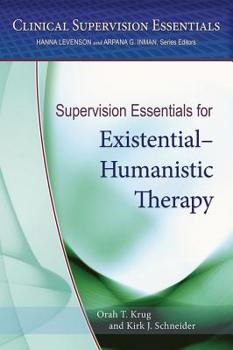Supervision Essentials for Existential-Humanistic Therapy
This concise guide applies the principles of Existential-Humanistic therapy to the practice of clinical supervision. With the skillful use of case examples--including transcripts and analyses of real sessions with a real clinical trainee--the authors utilize the key ingredients of the E-H therapeutic approach, including empathy, acceptance, and genuineness, to model how trainees can create safe, collaborative, and supportive relationships with clients...
Format:Paperback
Language:English
ISBN:1433822814
ISBN13:9781433822810
Release Date:May 2016
Publisher:American Psychological Association (APA)
Length:184 Pages
Weight:0.50 lbs.
Dimensions:0.4" x 6.0" x 9.0"
Related Subjects
PsychologyCustomer Reviews
0 rating





